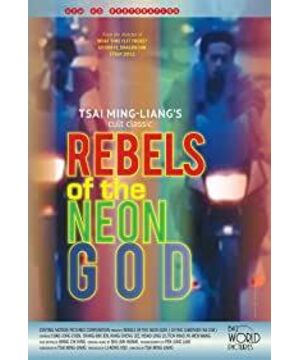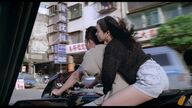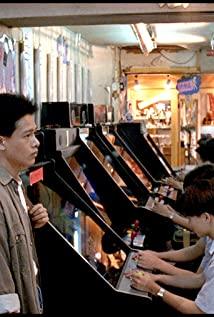Teenage Nezha & Long Live Love & River
Watching the water trilogy at the cinema in Jiujo, from day to night, the rain outside the cinema stopped and stopped. The joyful scenes under the fixed long shots are stripped of passion, only desire ebbs and flows slowly, and that damp intimacy surrounds the whole body.
What struck me most in "Teenage Nezha" was the parallel editing of Xiaokang and Aze in different rooms of the hotel. They were in completely independent scenes, but they shared similar compositions and performed coherent daily rituals. sexual action. Different from the fixed long shot that runs through the whole film, this paragraph appears in the second half of the film. The editing rhythm is faster and the emotional connection is deeper, reminding the audience of the contrasting relationship between the two in social identity and life experience.
Throughout the whole film, the encounter between Xiaokang and Aze is only a glimpse in the back seat of the taxi, which confirms Benjamin's saying that "the joy of city dwellers is not so much love at first sight, but love at the last glimpse." But under that clip of parallel editing, they were so close and so far apart, and their love had neither beginning nor end, what was the difference between Gu Ying's self-pity and embracing each other's coldness?
Similar passages naturally include Xiaokang and Ah Rong who share the same empty house in "Long Live Love". The moment A Rong knocked on the door of Xiaokang's room, one of them was under the wall lamp, and the other was hiding in the dark, like two ants who were cautiously touching their tentacles. When I saw this picture, I suddenly remembered that "Everyone in the Earth Hotel is destined to meet new neighbors". Coincidentally, "Long Live Love" also tells a story about "The New Tenant". Even in the narrative logic of the movie, there is no difference between selling a house and selling an urn. People's life, old age, sickness and death and the coming and going of old and new tenants will never be the same. stop.
From the perspective of portraying modernity, the water trilogy is really similar to Antonioni's love trilogy. There are two scenes of Yang Guimei walking in "Long Live Love", the first one is like Jeanne Moreau who roams alone in "Night", and the last one is like Monica Vitti in "Eclipse".
View more about Rebels of the Neon God reviews











